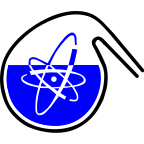Speaker
Description
Silica-based materials offer the opportunity for “selective decoration” where a large variety of adduct, ion exchange and chelate forming organic ligands can be attached directly to the surface. With the correct choice of ligand, in combination with high surface functionalisation, it is possible to offer high sorption capacity, fast exchange kinetics and selectivity for a variety of metal ions. The functionalised silicate backbone is also more compatible with the final waste forms utilised in the nuclear industry. For example, the metal-loaded silica could be directly converted to a glass-based waste form, currently the preferred option for high level waste disposal in the UK.
Here we report on our ongoing experiments to remove uranium, thorium, lanthanum and strontium from aqueous solutions using various silica-based resins, including bistriazinyl bipyridine silica (BTBP-Si), bistriazine silica (BT-Si), neocuproine-Si and the commercially available ethyl/butyl phosphonate silica (Phosphonics POH1). We have investigated a range of conditions, including pH, ionic strength, metal loading capacity and kinetics, which have been fitted using simple mathematical models, as well as performing column studies. We will also report on our ongoing efforts to convert the loaded silica resins into borosilicate-type glasses.

